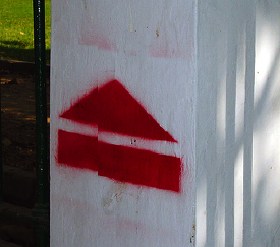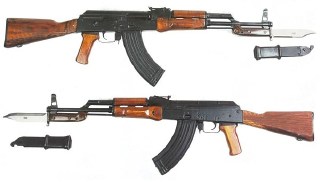Adil Najam
The picture is an old one. And too much had happened in Mingora since this was taken for this to be funny, or even interesting, any more. But since I just saw it I thought I would share.
Adil Najam
The picture is an old one. And too much had happened in Mingora since this was taken for this to be funny, or even interesting, any more. But since I just saw it I thought I would share.
Adil Najam
 I did not know Asim Butt.
I did not know Asim Butt.
Except through the excellent review of his art done by Raza Rumi and carried by us at ATP in July 2008, and through the ‘Eject’ sign graffiti that because popular in many civil society circles during the last days of Gen Musharraf’s government. But hearing today that he has died in what may be a suicide has left me down and dejected.
It is partly because a person of such obvious talent and great potential, someone with a strong political conscience and a desire and the ability to act on that conscience, and someone so young (“in the prime of his life” as we Pakistanis say) is no more. But it is also the way he has departed. Or chosen to depart. All death leaves one speechless for a minute. Suicide leaves one even more dumbstruck.
Adil Najam
 Even as violence of all forms spirals all over the country and even as, in the wake of the recent violence in there, politicians from all parties call for Karachi to be declared a “weapons free” zone (rightly!), it turns out that politicians and parliamentarians from all parties are busy distributing licenses for all forms of prohibited weapons as if these were kids candy.
Even as violence of all forms spirals all over the country and even as, in the wake of the recent violence in there, politicians from all parties call for Karachi to be declared a “weapons free” zone (rightly!), it turns out that politicians and parliamentarians from all parties are busy distributing licenses for all forms of prohibited weapons as if these were kids candy.
Equating social prestige with possession of weapons – especially the most lethal, more prohibited, and sometimes outright illegal ones – has always been an absurd idea, but it is absolutely indefensible under the current conditions of rampant and widespread violence.
Yet, giving licenses for prohibited – or difficult to possess – weapons has always been a cheap and easy ‘give away’ for politicians and bureaucrats. In a society where all politics is transactional, a license for a prohibited weapon is an “easy ask” and an “easy giveaway.” Those receiving the “favor” feel privileged and can show off their importance because they are now demonstrably “above the law.” Those doling out the “favor” can justify to themselves that one more weapon in a society so weaponized already will make scant difference.
Indeed, one more weapon might not make a difference; but tens of thousands certainly do. And that is exactly what parliamentarians have been doling out, often with the direct approval of the Prime Minister. If we are at all sincere in stopping the violence, not just in Karachi but all over the country, then this culture of violence and the glorification of violence and of the tools of violence must stop. Of course, it will not stop just because the Prime Minister will say so. But the Prime Minister must set the example, and must do so visibly and honestly. He can do so, at the very least, by stopping the issuance of all licenses for all prohibited weapons. For everyone. Altogether. They are, after all, prohibited weapons!